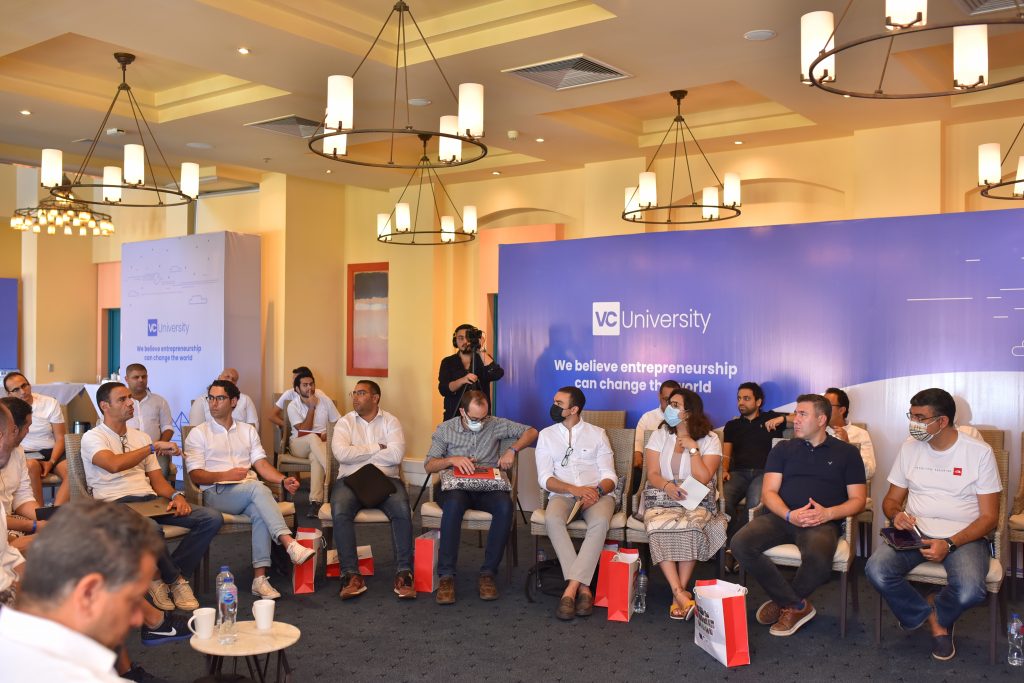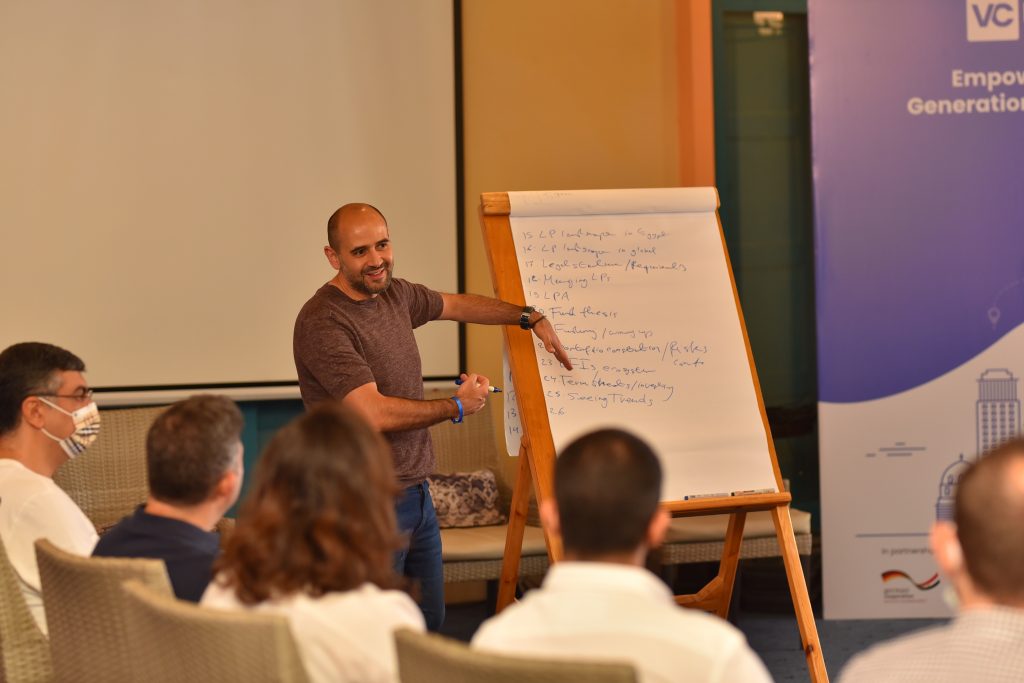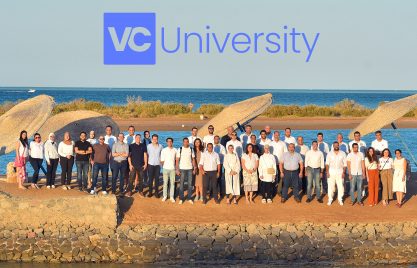Venture capital (VC) plays an indispensable role in promoting entrepreneurship. Not only can venture capital in itself have a positive impact on the market performance, revenue growth, profitability and resilience levels of start-ups, but also the access to management advice that young companies often receive from venture capital fund managers. On a broad level, venture capital can thus have a significant direct and positive impact on job creation, labour market diversification, economic growth and, ultimately, wealth creation. However, in order for VC fund managers to continue to foster the knowledge, skills and business acumen of young companies in the future, it is crucial that a next generation of capable VC fund managers grows up. With this in mind, GIZ Egypt is pleased to support the VC University programme to nurture the next generation of fund managers.
Why are alternative sources of funding like VC so important for Egypt?
According to the Enterprise Survey (Country Profile Egypt 2020) by the European Investment Bank (EIB), the European Bank for Reconstruction and Development (EBRD) and the World Bank, only 4 percent of Egyptian firms applied for credit (expressed demand) in 2019. 24 percent of resident firms would have needed a loan but were discouraged from applying (latent demand). According to the survey, 78 percent of those firms that would have actually needed a loan were discouraged from applying for a loan primarily due to excessive collateral requirements, complex application procedures and unfavourable interest rates, while only 2 percent of firms are classified as credit-constrained as a result of a loan application being rejected.
Compared between 2013 and 2019, the number of credit-constrained firms in Egypt increased by 6 percentage points and latent demand increased by 11 per cent. In addition, 98 percent of Egyptian firms surveyed in 2019 reported relying solely on internal sources for investment and/or working capital financing. However, of these 98 percent financially autarkic firms, only 6 per cent made investments. Comparing 2013 and 2019, the number of autarkic firms increased by 3 percentage points, with the number of firms that invested decreasing by 7 percentage points and those that did not invest increasing by 10 percentage points. Firms that are autarkic have lower demand for credit on average but are also more likely to be credit-constrained when they do need credit.
These alarming facts and figures regarding access to finance in Egypt strikingly underscore the importance that alternative sources of finance such as VC can have for Egyptian entrepreneurship, economic development and growth.
Andreas Ruepp, Head of the Access to Financial Services for SMEs project at GIZ Egypt put it succinctly,
“For GIZ Egypt, the innovative power of start-ups must be used to generate economic growth and employment. Access to risk capital is a key success factor for entrepreneurs. We are very excited to be part of this program “VC university” to support fund managers.”
But what exactly is the VC University programme?
The VC University is a 1-year programme designed to help 12 next-generation fund managers in the MENA region build their knowledge and skills through tailored curricula.
The aim of VC University is to empower and support participants to create new investment funds for the purpose of startup and SME development, contributing to increased productivity and growth in the region. Similarly, the programme aims to support participants in later stages of raising capital for existing funds.
Accordingly, the programme focuses on business development challenges and aims to bring together the 12 managers with international investors interested in investing in the business development of start-ups and SMEs via VC funds. The one-year programme is expected to trigger up to US$120 million in investment.
The methodological approach of the VC University is correspondingly broad. In addition to various educational events, this programme also includes discussion roundtables with experienced fund managers, internal networking events and contact initiation events with potential LPs (limited partners).
The following two quotes once again highlight the significance and importance of the VC University programme initiated jointly by Changelabs, Endure Capital, the Egyptian Micro, Small and Medium Enterprises Development Agency (MSMEDA), and GIZ:
Ali Saleh, Head of Young Enterprise Financing at GIZ Egypt said,
“There are a lot of programmes out there that are aiming at startups, yet the VC funds are left behind. We have seen that there’s a gap that needs to be filled.”
Tarek Fahim, Managing Partner at Endure Capital said,
“Endure Capital was established with a firm belief in promoting a healthy ecosystem and we managed to achieve this by investing in early-stage startups over more than 5 years. And now it’s time to transfer knowledge and help new fund managers to support more young people and entrepreneurs. With our collective efforts we can take the investment scene in Egypt to the next level.”
Kick-off with a 3-day bootcamp
Now, with a 3-day bootcamp, VC University recently had its first major event, bringing together the first cohort of participating fund managers – from Morocco to Jordan and Egypt – from different countries in the region to train them in business development and already connect them with international investors.


The future is anything but grey
The Egyptian market is an attractive one for investors as the country is projected by the International Monetary Fund (IMF) to be among the top 20 countries worldwide in terms of GDP―measured in purchasing power parity (PPP) at current prices—each year until 2025 (
In addition, the median age in Egypt in 2020 was 24.6 years. According to 2017 estimates, 37.6 percent of the population is currently 25-54 years old and an incredible 52.23 percent is under 25. Projections indicate that the median age will rise to 40.4 by 2100, so there is a window of perhaps 30 years to 2050 at the most for Egypt to reap a demographic dividend. However, a demographic dividend is not in itself a guarantee of economic growth, but merely represents a potential to be exploited (World Population Review 2021; Knoema 2021b; Zaky, Hassan 2009).
But what can be deduced from this?
Firstly, investors can take advantage of the good prospects of the Egyptian economy to invest in currently promising companies and capitalise on them. However, personal investment successes of investors can ultimately mean even more than an exploitation of given potentials.
Secondly, they can also contribute to a country’s entrepreneurial culture beginning to prosper more and more. Insofar as entrepreneurship is increasingly seen as a perspective by young people through the example of successful companies and inspires them to set up their own businesses, VC investors indirectly promote both new potential and, thirdly, future investment opportunities for themselves.
And a working population that is young for years to come, as is the case in Egypt, inherently harbours the potential for many young entrepreneurs and innovators to emerge from it. But entrepreneurial power can only develop to the extent of financially accessible leverage; that is certain.
Therefore, some risk-taking is undoubtedly required to boost the SME sector in particular, which accounts for about 75 per cent of private sector jobs but is currently unable to keep pace with the number of jobs needed, given an unemployment rate of 10.7 per cent and over 800,000 job seekers entering the Egyptian labour market annually. In addition, the SME sector in Egypt is primarily characterised by manufacturing jobs and only in some cases takes a progressive role in innovative and emerging sectors such as biotechnology, renewable energy, green ICT and services (Oxford Business Group 2021; USAID 2021).
Karim Samra, founder of Changelabs, sums it up as follows:
“Changelabs believes in bringing a variety of seed and early-stage investment options to Egypt, as this is an essential component of a robust startup and SME ecosystem. These investors take on greater risk and provide capital during the early stages of a company’s life. This new program will help train and launch the next generation of Egyptian venture investors who will help SMEs continue to drive the economy’s sustained growth.”
Against this backdrop, GIZ is pleased to be part of such a valuable initiative as the VC University Programme, which can help deliver a demographic dividend for Egypt by providing startup and SME-oriented VC management knowledge and skills.
By Hadeel Hegazy & Sebastian Kausemann



